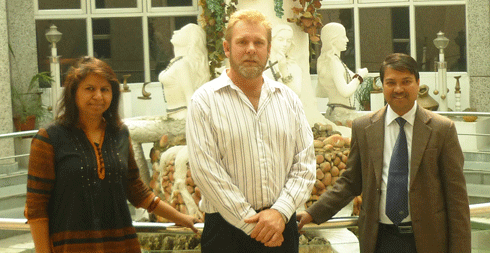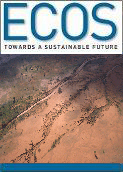
|
Published: 26 November 2012
Australia-India knowledge exchange for safer water
A workshop held in India in early November brought together researchers from CSIRO and CSIR India as the first step of a large, collaborative AusAID-funded project ‘SAFE WATER for the Future’ through the Indo-Oz Network.

|
|
(L-R) Dr Anu Kumar, David Ellis and Dr J.K. Jena from the National Bureau for Fish Genetic Resources at the aquarium facility in Lucknow. |
Dr Anu Kumar and David Ellis from the Water for a Healthy Country Flagship organised the first project workshop in Lucknow on 7 November.
A high level team of directors and scientists from India's Council of Scientific & Industrial Research (CSIR), the Indian Institute of Toxicology Research (IITR) – which is part of CSIR – and the National Bureau for Fish Genetic Resources (NBFGR) attended the workshop.
‘SAFE WATER for the Future’ is a two-and-a-half year project that aims to build India’s capacity in the use of ecotoxicological tools for managing environmental pollution from pesticides and micro-pollutants in rivers.
Director K.C. Gupta from the IITR said solutions for the water crisis in India necessitates cross-disciplinary research.
‘India and Australia can learn an enormous amount from each other’s experiences in determining the likely impacts of climate change, water shortages and the risks posed by cocktails of existing and emerging contaminants in water and sediments.’
The water crisis and the availability of safe good quality water for ecosystem and human health is a major driver for sustainable growth in India.
Fish kills from agricultural runoff and uncontrolled industrial and sewage discharges are a regular occurrence, with flow-on effects on local industries (e.g. aquaculture and fisheries) and communities, who depend on rivers as a source of drinking water.
Dr Kumar said techniques to measure and assess the risk of chemical contaminants including micro-pollutants such as endocrine disrupting chemicals, pharmaceuticals and pesticides in aquatic systems, using local species – principally fish and shellfish – are urgently required for India’s future sustainable development.
‘This project will specifically address these issues by training Indian and Australian scientists in ecotoxicological techniques and tools applicable to environmental issues in both countries,’ Dr Kumar said.
The workshop was the first of many planned knowledge exchanges between CSIRO and water management organisations in India. Further workshops, field visits and training exchanges are planned to occur between India’s Lucknow Delhi facilities and CSIRO’s Adelaide-based laboratories until February 2015.
Source: CSIRO



